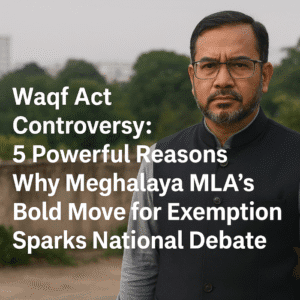Waqf Act Controversy: 5 Powerful Reasons Why Meghalaya MLA’s Bold Move for Exemption Sparks National Debate
In Meghalaya, Rajabala MLA Dr. Mizanur Rahman Kazi has urged Chief Minister Conrad Sangma to exempt the state from the Waqf (Amendment) Act, 2025, citing concerns over religious autonomy and secular values. The amended Act allows non-Muslims on Waqf Boards and expands government oversight—changes Dr. Kazi fears could violate Article 26 of the Constitution and disrupt communal harmony in a Christian-majority state where Muslims are a minority.
Meghalaya’s history of safeguarding local governance, including past exemptions from central laws, strengthens his case. Legal experts argue the Act challenges religious self-governance, while supporters defend it as a move toward transparency. Local Muslim leaders stress that their Waqf Board already functions well without interference, though some acknowledge the need for reform. The political implications are significant, as the state’s ruling party aligns with the Centre.
This debate reflects broader questions about federalism, minority rights, and the balance between reform and religious freedom in India’s pluralistic democracy.

Waqf Act Controversy: 5 Powerful Reasons Why Meghalaya MLA’s Bold Move for Exemption Sparks National Debate
In a move highlighting tensions between central legislation and regional religious autonomy, Rajabala legislator Dr. Mizanur Rahman Kazi has formally urged Meghalaya Chief Minister Conrad Sangma to exempt the state from the recently enacted Waqf (Amendment) Act, 2025. The appeal underscores broader debates about minority rights, secular governance, and the constitutional safeguards protecting India’s diverse communities.
Understanding the Controversy
The Waqf Act governs Islamic charitable endowments (waqf), which include properties donated for religious, educational, or social welfare purposes. The 2025 amendments permit non-Muslim members on Waqf Boards and grant government officials greater oversight of waqf assets. While proponents argue these changes enhance transparency and accountability, critics like Dr. Kazi view them as state encroachment on religious autonomy.
“The amendments risk diluting the constitutional right of religious communities to manage their affairs under Article 26,” Kazi stated. His petition warns that centralizing control over waqf properties could destabilize Meghalaya’s communal harmony, particularly in a state where Christians form 75% of the population and Muslims are a minority.
Meghalaya’s Unique Context
Meghalaya’s socio-political landscape adds layers to this debate. Governed partly by autonomous district councils under the Sixth Schedule of the Constitution, the state has long prioritized protecting tribal customs and minority rights. Exempting central laws that conflict with local governance is not unprecedented here. For instance, Meghalaya remains exempt from parts of the Citizenship Amendment Act (CAA) due to its special status.
Dr. Kazi’s appeal taps into this legacy, positioning exemption as a defense of Meghalaya’s secular ethos. “Respecting self-governance in religious matters isn’t just legal—it’s a cultural imperative,” says Shillong-based legal scholar Dr. Angela Lyngdoh. “The state’s harmony relies on balancing diverse identities without overreach.”
Constitutional and Political Implications
Article 26 of the Constitution guarantees religious denominations the right to manage their own affairs, a principle tested in landmark cases like Shirur Mutt (1954) and the Sabarimala Temple dispute. Kazi’s argument hinges on this precedent: if waqf management is deemed integral to Islamic religious practice, state interference could face legal challenges.
However, the amendment’s supporters counter that inclusive governance—such as involving non-Muslims in oversight—could prevent mismanagement of waqf assets, which total over ₹1.2 lakh crore nationwide. “Transparency shouldn’t be misconstrued as intrusion,” argues Delhi-based policy analyst Rohan Singh. “Many waqf properties lie underutilized or entangled in disputes. Reform is overdue.”
Local Voices and Practical Concerns
In Meghalaya, waqf properties include mosques, cemeteries, and schools serving the Muslim community. Local leaders fear the amendments could disrupt long-standing administrative practices. “Our Waqf Board has functioned smoothly without external interference,” says Abdul Bari, a trustee of a Shillong-based waqf. “Why fix what isn’t broken?”
Others, however, acknowledge the need for accountability. “Some properties could benefit from better oversight,” admits educator Fatima Ahmed, “but solutions must emerge from within the community, not be imposed centrally.”
The Road Ahead
Exempting Meghalaya would require either a presidential notification under Article 370 (applicable to Northeastern states) or state legislation. With Chief Minister Sangma’s National People’s Party (NPP) part of the NDA alliance, the decision carries political weight. Balancing regional sentiment with central allegiance will test the government’s commitment to its secular ideals.
As the debate unfolds, Meghalaya’s response could set a precedent for other states navigating similar tensions between religious autonomy and governance reforms. For now, Dr. Kazi’s petition has ignited a crucial conversation about whose voices shape India’s pluralistic democracy—and how.
You must be logged in to post a comment.